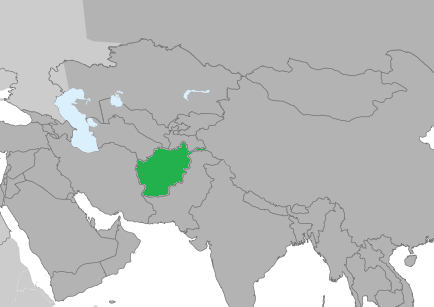A nation in chaos

Afghanistan, located in Southwestern Asia.
October 1, 2021
On August 31, all US troops were officially withdrawn from Afghanistan. This marked the end of major American influence in the country that was started by President George Bush in 2001, 20 years before.
The Taliban, an extremely conservative military organization that American officials wanted to replace due to their support of Al Qaeda, began retaking the land once held by the Afghanistan and American forces even before the full withdrawal had completed. By August, nearly every major city had been re-captured, and the Taliban quickly re-established themselves as the dominant governing force throughout Afghanistan.
The decision to withdraw military activity from Afghanistan has been promised by three presidents over the past 20 years: President Obama, President Trump, and now President Biden. It wasn’t until Biden’s Presidency that the act had ever been completed. In an official White House speech and following press conference on July 8, President Biden discussed the goals completed in Afghanistan, and his hopes for the future.
“As I said in April, the United States did what we went to do in Afghanistan: to get the terrorists who attacked us on 9/11 and to deliver justice to Osama Bin Laden, and to degrade the terrorist threat to keep Afghanistan from becoming a base from which attacks could be continued against the United States. We achieved those objectives. That’s why we went. We did not go to Afghanistan to nation-build. And it’s the right and the responsibility of the Afghan people alone to decide their future and how they want to run their country,” Biden said.
On the contrary, the United States military, after completing their original goal of punishing Al Qaeda and Osama Bin Laden, did establish deep roots into the Afghanistan government. The US assisted in raising their army, rebuilding their government, and pushing a more democratic and a largely American influenced society. This left Afghanistan fragile without the support of US troops and officials, and showed that the entire endeavor was unsustainable without the presence of a supporting military.
When President Biden was asked if a Taliban takeover was inevitable, his response indicated faith in the strength of the Afghanistan military.
“The Afghan troops have 300,000 well-equipped — as well-equipped as any army in the world — and an air force against something like 75,000 Taliban. It is not inevitable,” he said.
Despite these claims, the Taliban regained control of most of Afghanistan within the month of August, oftentimes with little to no resistance from the local military. This was in part due to the Taliban’s strategy of coercing rural and poorly-funded outposts that were nearly out of supplies into surrendering freely as long as they left their equipment behind. Due to the aforementioned lack of resources, the troops inside saw no other choice.
Poor management and poor funding were other major influences in the quick dissolution of the Afghanistan government. Oftentimes rations were poor quality, ammunition was short, and equipment was faulty, which led to dropping morale among Afghanistan soldiers. They weren’t willing to fight for a country that wasn’t providing them with basic needs.
Through this combination of struggles, the Afghan government fell to the Taliban. Upon gaining control, the Taliban began re-establishing their ultraconservative Islamic laws throughout the country. For example, they began quickly putting into place their conservative laws against women, some of which being the same laws from their previous rule in 2001. Women are now not allowed to leave home without the accompaniment of a male relative, and they must be completely covered head-to-toe. Co-education between the sexes has also been completely halted. These changes reflect poorly on the Taliban regime, as they had previously attempted to reassure the Afghan people that they would not repeat the same measures they did twenty years ago. As events continue to unfold, one thing is clear; Afghanistan affairs will be left alone by American officials for the foreseeable future, and the situation in the country will continue to develop with or without outside interference.


